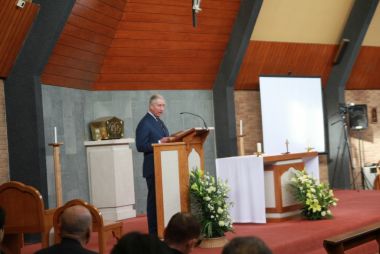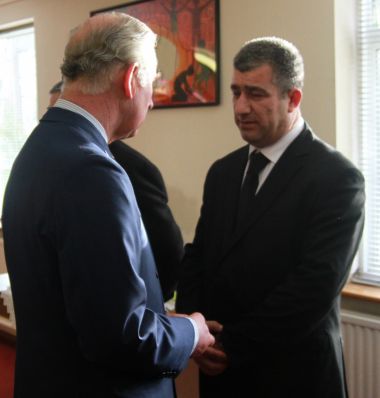Prince Charles condemns Islamic State violence as "blasphemy"

The Prince of Wales described the persecution of Christians in Iraq as "blasphemy" on the part of the Islamist militant group Islamic State (IS) in an address today.
Speaking in London to the Chaldean community at the Roman Catholic Church of the Holy Family, the Prince issued a heartfelt message for Christians facing persecution, and met Iraqi Christians living in the UK, many of whose families are still in Iraq, and have fled or are living under the pressing threat of violence from IS.
Condemning the violence, Prince Charles said: "It seems to me that all faiths to some extent shine a light on the divine image in every human life. If that is so, then surely to destroy another human being is to desecrate the image of the Divine, and to do so in the name of faith is nothing less than a blasphemy?"
As he spoke to church members, he was keen to stress that they and their families were in his prayers. In his address he said: "I feel extraordinarily inadequate in trying to express what I feel for what all of you are forced to go through, such indescribable agony. And the fact that I can be here with you [...] is merely a way of trying to show how much we feel for you."

One of the men the Prince met was Muaiad Salo, 47, who emigrated from Iraq in 2000, leaving his family behind. In July this year his father was murdered by militias in Baghdad. He cannot be certain that his father was killed by IS militants, but his brother told him that their father had been chopped up with knives, a practice that has been reported in other IS attacks. When his brother went to collect the body from the hospital, it was in a plastic bag, in which he could feel the separate pieces of his father's body.
Salo's brother has since been forced to leave Iraq after the Iraqi authorities told him he would not be safe. His sister and her four children remain in Baghdad. "The situation for them is life or death any second," Salo said. "They don't know what time they are coming to kill them like they did my father."
A member of the Chaldean community from Manchester, Mazin Naom, shared stories of his cousins in Iraq, who fled Mosul when the city was overtaken in by IS in June, and are now staying in the surrounding villages. Many of the families told a now-familiar story of people fleeing IS being forced to leave their homes without taking anything with them.
The number of Christians in Iraq has fallen from an estimated 1.5 million in the 1980s to around 400,000, and numbers are set to fall even further as more try to flee the violence.
"Iraq appears to have now to have lost its identity and its dignity," said Father Nadheer Dako, Chaldean Priest of the Church of the Holy Family.
Chaldean Catholics make up 75 per cent of Iraqi Christians, the majority of whom have been displaced. There are currently around 140,000 Christians sheltering in the northern region of Kurdistan, where Kurdish forces can offer some protection, but as the temperatures begin to plummet, they now face additional threats to their health.
The Prince compared the plight of Iraq's Christians to the experience of Jesus shortly after his birth: "As you know, the story of the Nativity ends with the Holy Family fleeing for refuge from persecution. You and your families are quite literally following in the footsteps of the Holy Family," he said.
Religious persecution has been an issue of concern for the Prince for some time, repeatedly speaking up for persecuted Christians, including a recent address to the House of Lords. He has also made a significant financial donation to Catholic charity Aid to the Church in Need, as well as delivering a video message earlier this month for the launch of a report by the charity on the persecution of Christians around the world.
The Prince also voiced some criticism of the violent images of IS victims that have been broadcast around the world, saying that we ought to have a "duty of care" towards the victims of violence and their families.











